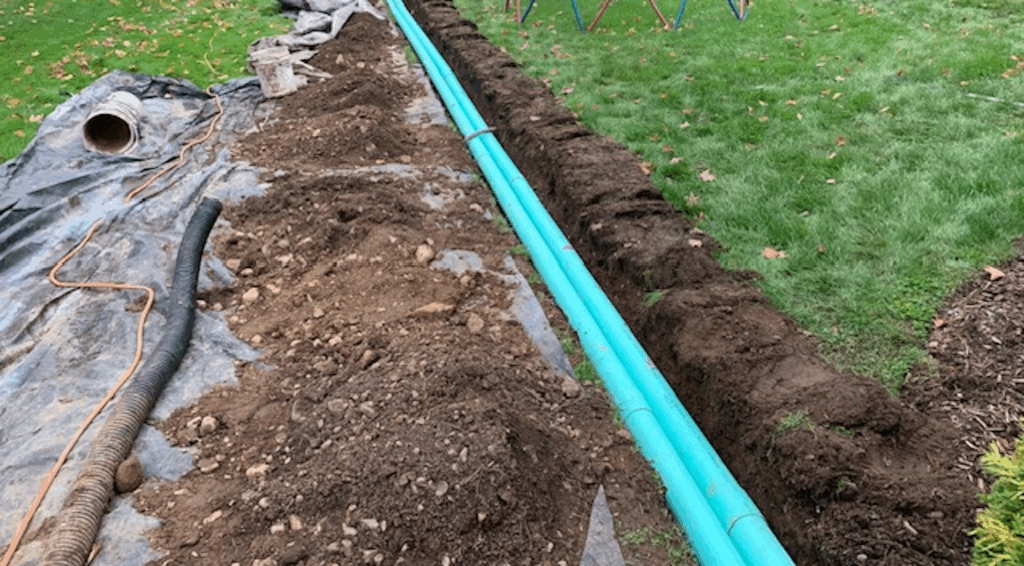Your basement is a critical part of your home’s foundation and structural integrity, but extremely vulnerable to pressure from outside moisture and shifting soils.
Northern and central New Jersey tend to experience higher rainfall than the national average, and many homes are built on clay soils that are very susceptible to hydrostatic pressure.
Over time, this pressure can act on your basement walls and foundation, leading to bowed walls and cracks that allow moisture to seep in. Even with a sump pump or parge seal, your basement will still experience water intrusion from the gaps in your basement walls and crawl space.
Waterproofing your basement is the best long-term solution to keep your basement dry and also protect your foundation from additional damage. This guide will explore seven reasons why basement waterproofing is essential for New Jersey homeowners, even if they don’t live in a FEMA-designated flood zone.

Basement waterproofing involves a combination of methods designed to keep water out and control moisture at its source. Depending on your home’s foundation, soil conditions, and level of water intrusion, a professional may recommend one or more of the following approaches:
By combining these techniques, basement waterproofing creates a comprehensive defense system that protects your foundation, keeps your living space dry, and preserves your home’s value for years to come.
Water damage can lead to structural issues, crumbling foundations, warped flooring, and mold remediation bills that often cost thousands. Even small leaks can turn into big problems if left unchecked.
Waterproofing is a proactive step that prevents water from ever becoming an issue. Investing now can save you from expensive emergency repairs later.
A damp basement creates an ideal environment for mold and mildew. These contaminants can spread into the rest of your home through the HVAC system, triggering allergies, asthma, and other respiratory conditions.
Waterproofing eliminates excess moisture, improving indoor air quality and keeping your family safe. This is especially critical if your basement is finished or regularly used.
Homebuyers see a dry, well-maintained basement as a huge plus. On the other hand, signs of water intrusion can instantly lower your resale value or scare buyers away.
A waterproofed basement reassures buyers that your home has been protected, making it more appealing on the market. In fact, waterproofing is often one of the highest-ROI home improvements.
Most homeowners use basements to store valuable or sentimental belongings—furniture, keepsakes, holiday decorations, tools, and more. Water damage can ruin these items forever.
Waterproofing keeps your storage safe from leaks, giving you peace of mind that your belongings are secure.
A finished basement can add significant square footage for a family room, gym, office, or rental unit. But if the space isn’t dry, you risk ruining your investment in flooring, drywall, and furniture.
Waterproofing ensures your basement is safe to finish and enjoy, opening up new possibilities for livable space.
Moisture in the basement doesn’t just damage walls and floors—it can also make your HVAC system work harder. Damp air requires more energy to heat and cool, leading to higher utility bills.
Waterproofing and sealing your basement reduces humidity levels, improving overall energy efficiency and lowering your monthly bills.
In New Jersey, summer storms are notorious for causing sudden flooding. 98% of U.S. basements will experience some form of water intrusion at least once, and NJ homeowners are particularly vulnerable due to older housing stock and frequent summer downpours.
Knowing your basement is waterproofed means you don’t have to panic every time the forecast calls for rain. Instead of worrying about leaks and flooding, you’ll have confidence that your home is protected.
Very common—especially in summer when heavy rainstorms can overwhelm older foundations. Many NJ basements experience water intrusion at least once, and FEMA estimates that 1 in 2 basements nationwide will deal with flooding in their lifetime.
DIY solutions like sealants and gutter maintenance can help with minor issues, but long-term protection usually requires professional-grade systems such as sump pumps or interior drainage.
Depending on the method, waterproofing can last decades. Professional systems often come with warranties that cover the life of the home.